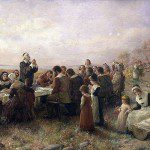The Worlds of the Scriptures
Ultimately, the purpose of reading the scriptures for a gospel scholar is to be able to visualize the worlds of the prophets who produced the scriptures, to recognize their personalities, to see their objectives, to relate to the audience that they were addressing, to recognize the techniques they used in achieving their objectives, to appreciate how they themselves used other scriptures, and to pick up on the subtleties of their allusions and their borrowings of phrases from their own scriptural traditions.
Our long-range objective, with the spirit of revelation, the gift of the Holy Ghost, and our best intellectual efforts, is to see things as the ancient prophets saw them and to know and be known as they knew and were known. This goal will not be achieved quickly; but with good guides and the tools described below, I believe that any person can go farther in this direction than even they might have ever thought possible. I know many readers who have surprised themselves by the amounts they have learned and the pleasure it has given them. My freshman students at BYU are overwhelmed at first, but look back with great astonishment and pleasure at how many tools they can master in even a single semester of study.
Tools for Gospel Scholarship
Gospel scholars work with tools in accomplishing specific tasks. Although many tools are technical and sophisticated, requiring years of experience to utilize effectively and properly, beginning scholars can take advantage of introductory and general purpose tools that provide solid overviews and important basic reference information. For the gospel scholar novice, here are my top few beginning recommendations.
First is the Encyclopedia of Mormonism. Buy a set. Use it regularly. [Now available at http://eom.BYU.edu.]This encyclopedia is unsurpassed in building a broad foundation for gospel scholarship. Its articles are concise, informative, and surprisingly complete, given the short length of each entry. Examine as many sources as possible listed at the end of each article in the Encyclopedia of Mormonism. The editors at Macmillan required each author to name the best LDS references for that particular topic. As a result, this encyclopedia provides a wonderful guide to the best gospel scholarship of the 20th century on many topics.
Next, I recommend to the budding scholar the student manuals prepared by the Church Educational System for use in the university and institute classes on the scriptures. These manuals provide good overviews, helpful notes and commentaries, important quotations, and useful points to ponder. These resources are also very inexpensive. Even the best gospel scholar should be aware of everything covered in these student manuals. Because so many people in the Church have read these materials, these manuals have become de facto coin of the realm. When speaking to informed audiences, gospel scholars ought to be able to assume that most people in the audience are familiar with these basic materials. To avoid plowing old ground or reinventing the wheel, gospel scholars need to know what has been written in the past and then to move on from there.
Then, gospel scholars need to begin building a personal library. Do it right from the beginning. Start today. And it is not enough simply to have a color-coordinated shelf of books on the wall; it is important to actually read the books, mark them up with your own marginal notes, and take notes on what you find (and keep them in your file system).
Be a sophisticated book buyer. Learn about your authors. Ask where they received their training, what else they have published, and what organizations they affiliate with. Try to figure out their driving interests, methods, standards, motives, biases, religious affiliation, style, and approaches. Inquire of knowledgeable people about the strengths and weaknesses of all authors.
Likewise, become a sophisticated connoisseur of book publishers. Try to discern the editorial policies and procedures of the presses that have produced your books. You can usually spot their institutional strings and orientations. For example, Oxford University Press tends to be traditional and conservative; Cambridge University Press more innovative. Some presses are Presbyterian; others are Baptist. The United Bible Society's publications strive to be neutral; Eerdmans and Zondervan are intentionally evangelical. In LDS circles, Deseret Book and Bookcraft are generally mainstream; Signature Books tends to be revisionist; etc. Widely based commercial publishers such as Macmillan, Doubleday, Harper-Collins, and others try to appeal to as broad a market as possible; Scholars Press and most university presses, including Brigham Young University publications, are much more specialized or professional. Select and read them all with understanding and discernment.




